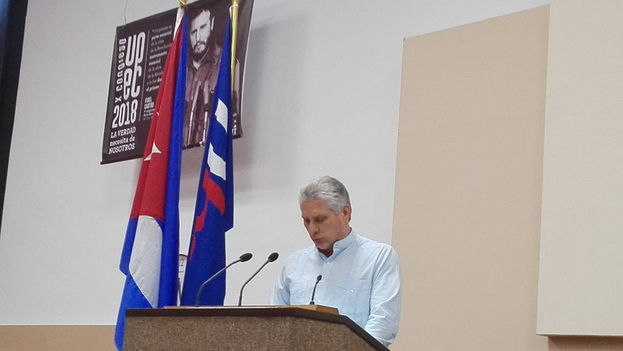
![]() 14ymedio Reinaldo Escobar, Havana, 16 July 2018 — In his first ideological speech, President Miguel Díaz-Canel displayed with astonishing simplicity the scope of his political thought in his closing remarks at the 10th Congress of the Cuban Journalists Union (UPEC), a meeting in which professionals of the official press raised the slogan “The truth needs us.”
14ymedio Reinaldo Escobar, Havana, 16 July 2018 — In his first ideological speech, President Miguel Díaz-Canel displayed with astonishing simplicity the scope of his political thought in his closing remarks at the 10th Congress of the Cuban Journalists Union (UPEC), a meeting in which professionals of the official press raised the slogan “The truth needs us.”
In the Manichean vision of the world detailed by the leader this Saturday, on one side is “the logic of capital, selfish and exclusionary,” while on the other stands the “socialist and (José) Marti logic, the fidelista (faithful to Fidel Castro), showing solidarity and generosity.” For him there are no half measures.
The Communist Party has a monopoly on the truth and whoever disputes it is an enemy of the homeland and in the pay of the empire. In order to erect these intimidating arguments, the newly appointed president hides behind the definition of a besieged square and alludes to the testament received from the ‘historic generation’ – those who fought in the Revolution.
People who spent months digging into the sources and integral parts of Diaz-Canel’s thought must have suffered great frustration this Saturday when listening to so many simple things. Especially those who believed they had found a nugget of gold in the poetic quote from the singer-songwriter Silvio Rodríguez in his inauguration speech on 19 April.
The words from Rodriguez quoted by Diaz-Canel – “You don’t need wings to take flight” – inspired some hopeful to believe he might be planning to undertake a daring comeback. Instead, before the 267 journalists gathered in the congress, he chose to recommend the complete reading of the text The New Revolutionaries, signed by the official troll Manuel Henríquez Lagarde.
Of course you don’t need wings for such a low altitude flight.
Exclusionary and partisan, the president considered it appropriate not to invite independent journalists to the discussions of the new communication policy “because they are not part of UPEC nor of Cuban society, which earned through its efforts and sacrifices the exclusive right to discuss how to design the future.” Although he did not say it, it was clear that nor would independent journalists have the right to have a separate congress.
The Social Communication Policy that has taken shape in this conclave recognizes only two types of ownership for the mass media in the country: state and social. The document, which has not been published in its entirety, defines access to information, communications and knowledge as a public good; it establishes obligations to the rest of the institutions and amplifies the powers of media executives.
What has not been amplified with sufficient emphasis is what Marino Murillo noted in one of the sessions of the congress when he said that “this policy, which represents a starting point to begin working,” implies the creation of three legal projects, and a subsequent monitoring of compliance with this policy through objectives, goals and indicators.
Díaz-Canel acknowledged that among the pending tasks is for “the country our media shows [to look more like the] country we are.” This requires the fulfillment of another of the announced foundations of the new policy which refers to “respect for the diversity that we are.”
The governing spheres hold a narrow meaning of “diversity” in which they include race, sex, age, province of origin, religion and occupational profile, which has been timidly increased to include sexual orientation. The law can penalize someone who discriminates against a young woman from Guantanamo who is a lesbian, black, Catholic and self-employed, but if this same person shows her social-democratic or liberal inclinations then she would be punished.
Nor could she belong to the Ladies in White, promote the Cuba Decides project, be a member of UNPACU, the Christian Liberation Movement, MUAD or FANTU. She could not be an activist defending human rights, open an unauthorized library or exercise independent journalism. Of all this, nothing!
In order for the country that appears in the press to resemble the real country in all its diversity, the diversity must also reach social communication media. The nation will continue to be a puzzle that lacks pieces if the existence of political opposition and independent civil society is not recognized, if it is not accepted once and for all that Cubans are everyone, wherever they live and whatever they think.
The truth needs many actors and different versions. It requires debate and confrontation among ideas and, above all, freedom. While it is true, that as the crucified one said, “the truth will set you free,” it is also indisputable that freedom will make us truthful.
_______________________________
The 14ymedio team is committed to serious journalism that reflects the reality of deep Cuba. Thank you for joining us on this long road. We invite you to continue supporting us, but this time by becoming a member of 14ymedio. Together we can continue to transform journalism in Cuba.
